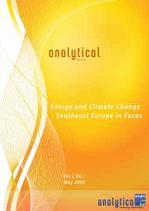ENERGY SECURITY IN A LEGAL CONTEXT - SOME REMARKS IN THE LIGHT OF COMMUNITY LAW AND TREATY ESTABLISHING THE ENERGY COMMUNITY IN PARTICULAR
ENERGY SECURITY IN A LEGAL CONTEXT - SOME REMARKS IN THE LIGHT OF COMMUNITY LAW AND TREATY ESTABLISHING THE ENERGY COMMUNITY IN PARTICULAR
Author(s): Piotr BogdanowiczSubject(s): Law, Constitution, Jurisprudence
Published by: Аналитика Тинк-тенк Организација
Summary/Abstract: The process of creating an integrated market in electricity among Member States has nearly reached completion. The internal energy market should be subject to, among other things, common minimum standards respected by all Member States, and there should be common objectives with respect to “three pillars of the energy in the European Union”, i.e. security of supply, environmental protection and equivalent levels of competition. At the same time, the notion of “energy security”, understood in general as adequacy of energy supply at a reasonable price, is becoming an issue of increasing importance to the European Union. What is more, Member States view energy security not only in an economic or political context but also perceive it from a legal perspective. The problem is that the multi-faceted nature of energy security, involving its legal (e.g. definitions and regulations), political (e.g. dependence of the European Union on supplies from outside sources) and technical (e.g. physical availability of energy, satisfactory operation of the grid) aspects, makes it very difficult to provide a definition of energy security that is accepted by all. The main aim of this paper is to analyse whether the notion of “energy security” is condemned to be only a carrier notion in political discussions and empty words in legal texts, or whether it truly deserves to be one of the pillars of energy policy in the European Union. A good illustration of this issue seems to be the Treaty establishing the Energy Community concluded on 25 October 2005 between the European Community, on the one hand, and several countries of South East Europe, including Albania, Bosnia and Herzegovina, Bulgaria, Croatia, Republic of Macedonia, Montenegro, Romania and Serbia, as well as the United Nations Interim Administration Mission in Kosovo (as Kosovo representative under resolution of the Security Council no. 1244), on the other (hereinafter referred to as the “Energy Treaty”). It is because one of the main tasks of the Energy Treaty is to organise relations between the parties in order to enhance the security of supply of the single regulatory space. However, the Energy Treaty does not contain any operational measures in this respect. Furthermore, although the signatory states undertook to adopt in prescribed terms certain EU single market regulations, called the “acquis communaitare on energy”, these regulations did not concern, for instance, any document, with respect to the development of energy security. Before the issue of energy security in the Energy Treaty is addressed, it seems necessary to review the notion of "energy security" in the Community law, relationship between energy security and energy market liberalisation and, finally, legislation on the energy security in the Community law.
Journal: Analytical
- Issue Year: 2009
- Issue No: 03
- Page Range: 1-9
- Page Count: 9
- Language: English

